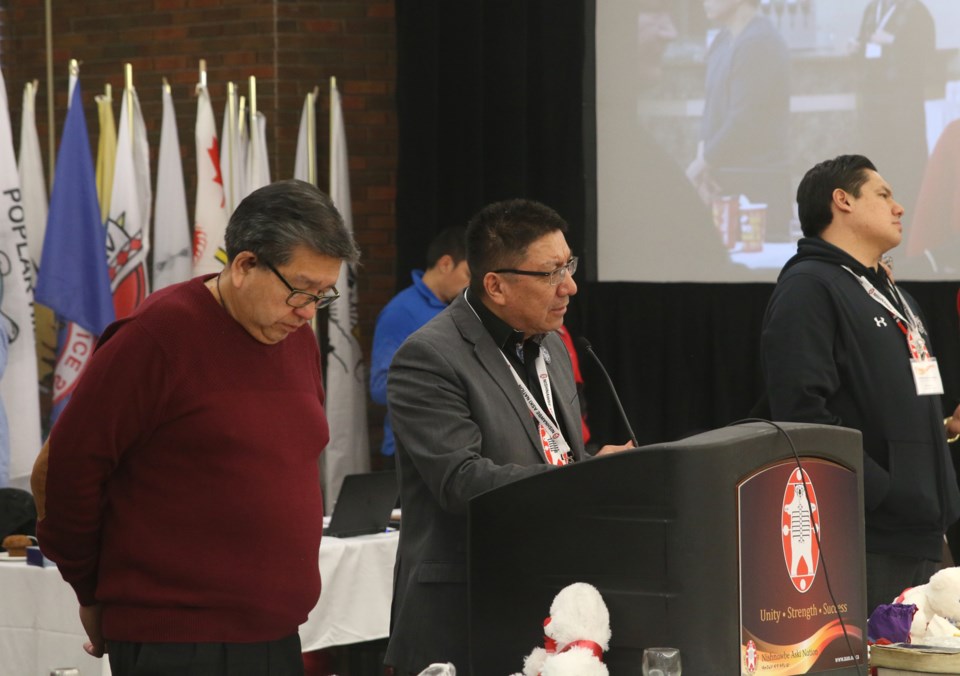THUNDER BAY - The suicide crisis on northern First Nations communities was the top priority during the Nishnawbe Aski Nation Winter Chiefs Assembly, but chiefs remain hopeful, and one Northern Ontario youth will be fighting for change at the highest level.
“I feel a sense of hope from this meeting because I believe we tackled a lot of the hard issues and a lot of the issues that are not really talked about too much,” said NAN deputy Grand Chief, Jason Smallboy. “We kind of dove right in and got our hands dirty. I feel like now we have a clear direction to which way we want to go to try and put an end to the suicide crisis.”
On Thursday, the three day Winter Chiefs Assembly came to a close. Throughout the assembly, chiefs from the 49 NAN communities tackled issues affecting their members.
“One of the main issues that we talked about and that kept coming up was suicide because of all the crisis we’ve been having in our territory,” Smallboy said. “All our leaders and chiefs felt that was the number one priority. Our members are dying, they are losing hope, so we talked about how we can address the issue to the core and how to bring out members out of that.”
A state of emergency was declared in the Wapekeka First Nation last month following the loss of two 12-year-old girls who took their own lives.
Smallboy said chiefs and members would like to see more resources at the First Nation level. He explained that crisis teams that are sent into remote communities following a crisis, leave two weeks later, leaving the community back to the status quo.
“We talked about how more resources are needed at the ground level,” he said. “Our people are hurting. We want to focus on the healing.”
According to Smallboy, healing needs to begin with youth speaking up and lending their voice to the conversation.
“Youth have always been an important part of our culture,” he said. “With all the recent suicides, that is where we will be turning to. What do they want, what are they looking for? What do they want to see at the NAN level?”
Riley Yesno, a 17-year-old from the Eabametoong First Nation, will be one of the youth leading the charge for change.
In January, Yesno was named to the Prime Minister’s Youth Council, a council of young Canadian’s from across the country who advise Prime Minister Justin Trudeau on national issues affecting youth.
“He made it very clear that youth issues are very important,” Yesno said. “And in the last election we saw that more youth came out than ever before. I think that’s a testament to how much engagement youth have in politics, how they feel about their county, and I think he recognizes that and something he wants to be a part of.”
Yesno is the only representative on the Youth Council from Northern Ontario. She said she wants to bring the issue of indigenous equity to the table and in order to do that, she said she will be going out into the communities and talking to the people.
“Everyone realizes that indigenous equity is something that needs to be worked on and we have a lot of problems we have to face,” she said. “But having that firsthand experience is really valuable. I want to go into these communities and places like Dennis Franklin Cromarty High School and I want to talk to them so I have their opinions so when I’m sitting in front of the Prime Minister, I have something useful to say and my words actually make an impact for those communities.”
With a direct line to the Prime Minister of Canada, Yesno said she is hopeful she, and her fellow youth, will help bring about change and reconciliation.
“I think young people especially are realizing the importance of fixing these issues for indigenous people and recognizing these issues right here in Canada that often go over looked,” she said.
And while she is feeling the pressure of being only a single voice from Northern Ontario, she encourages other young people to send their own applications for the Prime Minister’s Youth Council and join the conversation.
“Put yourself out there,” she said. “Your voice can be heard.”
